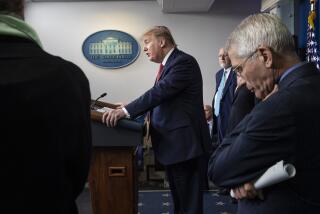Will Foe Throw Tobacco Firms a Lifeboat?
- Share via
WASHINGTON — Does Rep. Henry A. Waxman (D-Los Angeles), who has tormented the nation’s cigarette manufacturers for 15 years, now loom as the tobacco industry’s savior ?
This scenario, which would have been thought surreal only months ago, suddenly seems only mildly far-fetched. And it reflects how far the fortunes of the once-mighty tobacco lobby have fallen, particularly amid damaging revelations in recent months.
Ever since Waxman, himself a former smoker, took over the Energy and Commerce subcommittee on health and environment in 1979, he has used the post as a bully pulpit to attack cigarette makers. When he embarked on his then lonely crusade against one of the country’s richest and most powerful interests, it was considered hazardous to a lawmaker’s health.
Nonetheless, it was Waxman’s bill in 1984 that created the current series of rotating warning labels on cigarette packs and advertising. In 1990, he sought to severely restrict tobacco companies’ ability to link their brands with glamorous and appealing models in print ads and on billboards. But Congress wasn’t ready to go that far just yet.
Then last year, the Environmental Protection Agency issued a landmark report stating that secondhand tobacco smoke poses a significant health risk to nonsmokers and is responsible for about 3,000 lung cancer deaths a year in the United States. Waxman jumped back in.
He has held a series of high-profile hearings, including a historic session where the heads of seven cigarette companies testified for the first time. These carefully staged media events--which critics have likened to an inquisition--have rocked the industry.
At the same time, the Food and Drug Administration, armed with newly disclosed industry documents, began to pursue evidence to declare nicotine an addictive drug. This is the most profound threat ever faced by the tobacco companies.
In recent months, the two efforts have merged, with FDA Commissioner David A. Kessler testifying before Waxman’s panel. The most explosive information that has come out includes allegations that cigarette companies have known their products are addictive and have manipulated nicotine levels to keep their customers hooked.
The tobacco executives have denied these assertions under oath.
If the FDA determines nicotine is indeed a drug, under the law it would then have to declare it “safe and effective” or ban it. Waxman says the agency would have no choice but to outlaw cigarettes, which the government blames for more than 400,000 deaths each year.
This specter could force the $50-billion-a-year industry to ask Waxman and other longtime, powerfully positioned adversaries to help craft compromise legislation that would empower the FDA to regulate advertising, promotion, sales and nicotine levels--in exchange for keeping cigarettes on the market.
This would be fine with Waxman. He insists he is not seeking to prohibit smoking for the nearly 50 million Americans who do so. Rather, he says he wants “to discourage people from smoking” by restricting the $4-billion-a-year campaign to market cigarettes, especially to young people, who represent the industry’s future lifeblood.
And he has sponsored legislation, which has passed his subcommittee, to restrict smoking to rooms with separate exhaust systems in all public places except bars, restaurants and prisons.
The FDA’s inquiry into regulating nicotine has begun to alter the dynamics on Capitol Hill. Thomas E. Sandefur Jr., chief executive of Brown & Williamson Tobacco, has accepted Waxman’s invitation to meet privately to discuss “reasonable regulation.” Other executives may be interested as well. Such a meeting would be a first.
This doesn’t mean, of course, that the industry is ready to embrace the diminutive lawmaker who some tobacco officials previously derided as “Hollywood Henry” --a sobriquet meant to suggest a publicity hound who was out of touch with mainstream America.
Only this week, Walker Merryman, vice president of the Tobacco Institute, described Waxman’s anti-cigarette efforts as “unmitigated zealotry, no question about that. Sort of like an 18-wheeler without brakes on the Golden State Freeway during rush hour.”
But, privately, even some tobacco advocates acknowledge that the day may come when they need the relentless Waxman, of all people, to help keep them alive.
“It would be ironic,” an industry activist mused. “We live in interesting times.”
More to Read
Get the L.A. Times Politics newsletter
Deeply reported insights into legislation, politics and policy from Sacramento, Washington and beyond. In your inbox twice per week.
You may occasionally receive promotional content from the Los Angeles Times.








